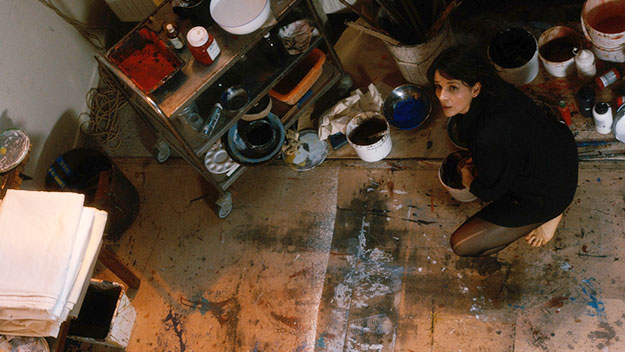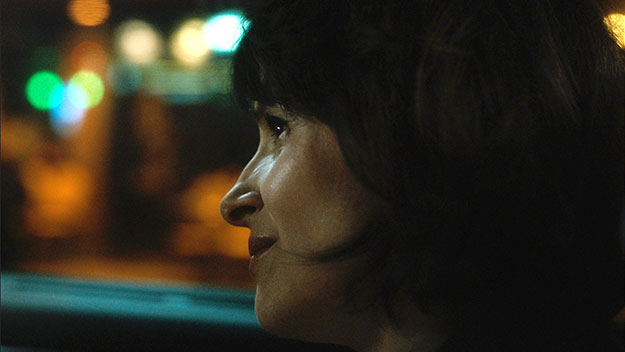Interview: Juliette Binoche

Claire Denis said that making Let the Sunshine In was liberating for her and served as therapy to the hardships of producing High Life, her upcoming science fiction film starring you, André 3000, and Robert Pattinson. How was your experience acting in Let the Sunshine In?
The script was very well written, and I took it as a challenge to have to abide by such a demanding, almost literary, text, but also as a gift, because you rarely get such well-written scripts. I went into the shoot without any preconceptions, because I had never worked with Claire before, so I really proceeded from a desire to be as close as possible to her and to what she was looking for. But during the shoot, I realized that Claire wasn’t strict at all as to what she wanted and instead very open to what could come out of the scenes. So each time Isabelle finds herself in a new situation with a different man, the question for us was how to welcome him into the configuration of the shoot as well as into our friendship with Claire.
The camera has a very symbiotic and organic relationship with you, intimately wrapping around you in sync with your emotional life. Did Denis give you a lot of freedom in terms of staging?
Yes. Initially, I thought that I would always have to make a gesture toward her, but she showed me that she was willing to do the same. So we didn’t need to explain things to each other and our collaboration unfolded very naturally as we both managed to stay in tune with one another. On films with a strong subject like this, communication often happens nonverbally and what is left unsaid is more compelling than the words themselves.
Isabelle simultaneously embodies seduction and innocence, evoking a femme fatale with her sensuous clothing and body language while a child with her pure, vulnerable, and idealistic inner world. How did you weave together these facets of her personality?
For me, innocence does not belong to an age, and you can be as innocent at 90 as at 2. Going after her desire, Isabelle does not have any preconceptions nor does she try to anticipate her feelings, and that would be my definition of innocence. She is going through a difficult phase in her life where she is separated from the father of her child and fed up with being alone, so she wants to find somebody to spend her life with. So her yearning to be sensual and desired doesn’t contradict her innocence. It is simply her way of going toward the other and the world.
You poignantly convey this tension between her desire to give in and her instinct to protect herself in her encounters with Nicolas Duvauchelle’s character, an actor, which physically translate as a sort of cat-and-mouse game.
The character of the actor has a very perverse kind of personality and is quite manipulative of Isabelle. She puts up with him because she is attracted to him and desires him. He is also an artist, and she wants to be carried away. But his perversion becomes unbearable at a certain point because she finds herself pushed between two worlds, between yes and no, between feeling very happy one day and being dumped the next. One has to know how to get out of hurtful relationships, so Isabelle is right in putting an end to that one. But letting go is not always easy, because our need to be reassured, protected, and loved can sometimes overpower everything else. When we fall in love with someone, we don’t always have an explanation for it, because there is a connection, a physical attraction there that transcends understanding, and it’s only through living it out that we realize why we were attracted to that person in the first place. One of Isabelle’s defining characteristics is that she dives into every relationship with the same amount of faith and the desire to make it work. Despite being hurt over and over again, she finds the courage and the freedom within herself to start anew and to believe in the possibility of love once more.

Your performance in Let the Sunshine In draws intensity from subtle nonverbal moments that play out as internal monologues, like that scene early on in the film in which the Xavier Beauvois character’s chauffeur drives Isabelle home and one can viscerally feel her humiliation at being perceived like somebody’s mistress. I know you prepare for your roles with acting coach Susan Batson in New York. Does working with her help you uncover the psychological layers of the script?
Susan and I have been working together for a long time and know each other very well. We try as much as possible to connect the demands of the part with personal memories that can be of significance to the story. We dig into the script scene by scene, but most importantly, we try to acquire a general picture of the film just like a director would. The actor’s work is not about being manipulated by the director, but about crafting an internal vision of the film that will marry with the vision of the director as well as with that of everyone else making the movie. I don’t have a set routine in terms of preparing for a role, which means that sometimes I prepare way in advance and other times right before the shoot, if at all. For this project, I wanted to prepare since we only shot for five weeks and I needed to navigate the different movements of the film efficiently.
You’ve collaborated with directors like Krzysztof Kieślowski, Olivier Assayas, Bruno Dumont, and now Claire Denis, who converge in their interest in capturing their protagonists’ inner lives and sensorial relationship to the world. Do you recognize links between their methods?
No, they’re all very different from each other. What they have in common are cinephilic culture and very strong personalities. These are all people with whom I felt I was able to engage in my craft and who welcomed the actress that I am without imposing anything on me. Their films were like invitations to enter a world and build onto it together. For instance, Claire really likes to see the actor in place before setting down the camera. She works like a portrait painter and needs to be moved by what she films. If a frame doesn’t move her, she keeps searching until it does. Our meeting was very beautiful and natural on that level, and we both remained true to ourselves throughout the process. Bruno, on the other hand, prepares a lot ahead of time and has a very precise idea of what he wants. With Krzysztof, we worked quite quickly and organically. There were a lot of rehearsals and he would do the mise en scène, but he didn’t always know which labyrinth to take to delve inside the character, and that’s where we actors came into play.
What did you take away from working with Denis?
We have a mutual respect and admiration for each other that allows us to forget ourselves and work together towards a film. Claire has an unconditional love for actors and always expresses what she thinks and feels, which is very rewarding because a director who does not communicate what they feel can be difficult and make you feel lonely. I collaborated with Claire on two very different projects within the same year. High Life was a very different filming experience and involved a lot more actors than Let the Sunshine In, but I observed the same organic approach from her. She has this beautiful way of investigating the possibilities of the moment.
Translated by Yonca Talu.
Yonca Talu is a filmmaker living in Paris. She grew up in Istanbul and graduated from NYU Tisch.







